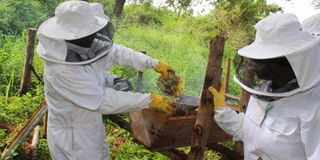Pearl Dairy diversifies into honey production

Pearl Dairy says by moving into honey production, it will diversifying farmer incomes and its revenue streams. PHOTO | FILE
What you need to know:
- The project, Mr Van den berg said, will be done in phases with the first phase, which seeks to have the first batch of honey on the market by January 2021, already ongoing.
By Charlotte Ninsiima
Pearl Dairy Farms will invest more than Shs10b in commercial honey farming through a partnership with local dairy farmers.
The move seeks to diversify both the company and farmers’ incomes, given challenges that have faced the milk production and processing industry.
The industry has seen an unprecedented increase in supply and plummeting prices amid a narrowing market, especially on the export side.
In February, Kenya locked out milk products from Pearl Diary on claims that the company was re-exporting and dumping “cheap milk” on its market.
The ban was exacerbated by Covid-19, which saw products consumption slump to unprecedented levels.
Pearl Dairy has also not been able to re-enter the Rwandan market that was locked to a number of Ugandan products including Lato milk.
More than 10,000 dairy farmers in the south western districts of Ntungamo, Kabale, Lyantonde, Mubende, Mbarara, Kiruhura, Bushenyi, Rukungiri and Sheema that had been affected by milk-related challenges will be introduced to honey to diversify their incomes .
The initiative will mainly seek to assist families of the dairy farmers with a secondary income to shield them from the gross effect of Covid-19.
It seeks to reach more than 10,000 farmers in the western region to produce more than 1,000 metric tonnes of verified and high-quality raw honey to be sold locally and exported to both regional and global markets.
Mr Michael Van den berg, the Pearl Dairy project manager, said one of the key target markets will be Europe where Uganda’s honey is already accepted.
Uganda, he said, has not been able to leverage on demand for its honey in Europe due to challenges associated with quality and quantity.
The Shs10b investment will be a major boost and provide each participating family with at least 10 beehives and a dedicated team of apiculture development executives will be deployed to work with and train farmers to achieve maximum profitability.
The project, Mr Van den berg said, will be done in phases with the first phase, which seeks to have the first batch of honey on the market by January 2021, already ongoing.
Globally, honey is accepted as one of the most nutritious, healthy and natural foods packed with minerals, enzymes, vitamins and proteins.
Low cadre jobs
The programme will mainly seek to train women and youth in bee keeping to strengthen their capacity as well as create low cadre jobs.




